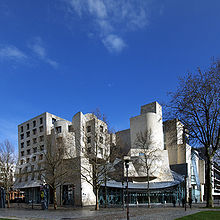- Cinémathèque Française
-
 The current home of the Cinémathèque Française at 51 rue de Bercy, designed by American architect Frank Gehry.
The current home of the Cinémathèque Française at 51 rue de Bercy, designed by American architect Frank Gehry.
The Cinémathèque Française (French pronunciation: [sinematɛk fʁɑ̃sɛz]) holds one of the largest archives of films, movie documents and film-related objects in the world. Located in Paris, the Cinémathèque holds daily screenings of films from around the world.
Contents
History
The collection emerged from the efforts of Henri Langlois in the 1930s to collect and preserve films. Langlois had acquired one of the largest collections in the world by the beginning of World War II, only to have it nearly wiped out by the German authorities in occupied France, who ordered the destruction of all films made prior to 1937. He and his friends smuggled huge numbers of documents and films to unoccupied France to protect them until the end of the war.
After the war, the French government provided a small screening room, staff and subsidy for the collection, which was first relocated to the Avenue de Messine. Significant French filmmakers of the 1940s and 1950s, including Robert Bresson, René Clément, Henri-Georges Clouzot and Jacques Becker frequented screenings at the Cinémathèque. Directors of the New Wave (la Nouvelle Vague) school — Alain Resnais, Jacques Rivette, François Truffaut, Jean-Luc Godard, Claude Chabrol, Roger Vadim, Jacques Doniol-Valcroze, and Pierre Kast — also received much of their film education by attending the collection's screenings.
Location
After numerous incidents — including multiple relocations from one small screening room to another through the 1950s and after, the "Langlois affair" in 1968 (his firing led to protests which eventually closed the Cinémathèque for a short period), and a fire in its last premises — the Cinémathèque Française moved to 51, rue de Bercy in the 12th arrondissement of Paris and reopened its doors in a postmodern building designed by Frank Gehry, an American architect. A restaurant on the lower level is open to the public.
The Bibliothèque du Film, which was created in 1992 to show the history of cinema, its production, impact and artistic strength, has recently merged with the Cinémathèque Française.
President Director & Secretary
President: Costa-Gavras, Oscar-nominated director of Z, "State of Siege", Berlin Golden Bear-winning director of Music Box and Cannes Golden Palm-winning director of Missing
Director: Serge Toubiana, former editor-in-chief of Les Cahiers du cinéma
General Secretary: Jean-Michel Arnold, the spiritual successor of Henri Langlois and consistently re-elected as General Secretary since 1981
Honorary Presidents:
References in popular culture
The Cinémathèque's closing is noted in Truffaut's Stolen Kisses and plays a major role in Bernardo Bertolucci's The Dreamers. The Cinémathèque also appears in the Paul Auster novel The Book of Illusions and the Harvey Danger song "Private Helicopter."
See also
- Cinematheque
- The International Federation of Film Archives
References
- Grenier, Cynthia (Feb. 13, 2004). Langlois' film world seen with rose colors The Washington Times.
- Roud, Richard (1983) A Passion for Films: Henri Langlois and the Cinémathèque Française, London: Secker and Warburg; New York: Viking Press ISBN 0-67-036687-0.
External links
Coordinates: 48°50′13″N 2°22′57″E / 48.83694°N 2.3825°E
French New Wave Directors Left Bank Henri Colpi · Marguerite Duras · Armand Gatti · Chris Marker · Alain Resnais · Agnès Varda
Other filmmakers Influences Alexandre Astruc · André Bazin · Robert Bresson · Jacques Doniol-Valcroze · Henri Langlois · Joseph-Marie Lo Duca · Jean Vigo · Pierre Braunberger
Key films Le Beau Serge (1958) · The 400 Blows (1959) · Hiroshima mon amour (1959) · Breathless (1960) · Cléo from 5 to 7 (1962) · Adieu Philippine (1962)
Related topics Auteur theory · Cahiers du cinéma · Cinémathèque Française · Jump cut
Categories:- Archives in France
- Cinema of France
- Frank Gehry buildings
- Expressionist architecture
- Postmodern architecture
- Film archives
Wikimedia Foundation. 2010.
